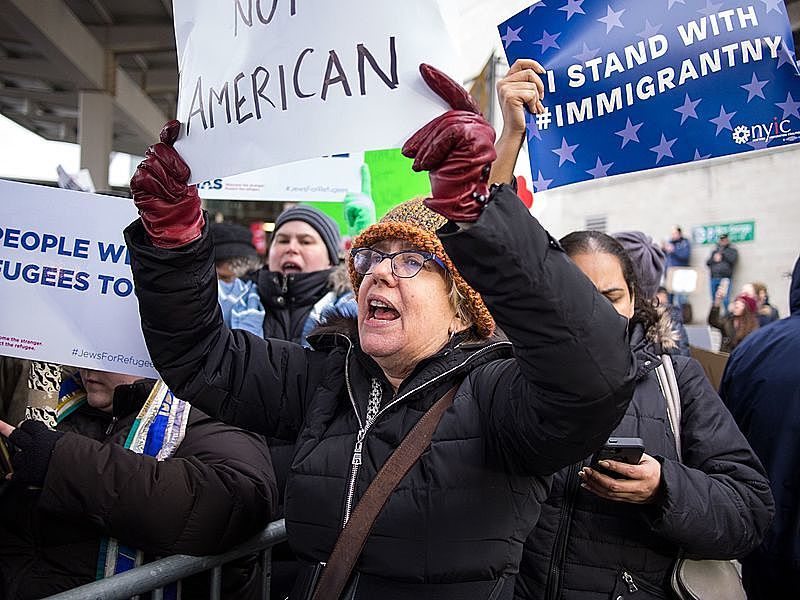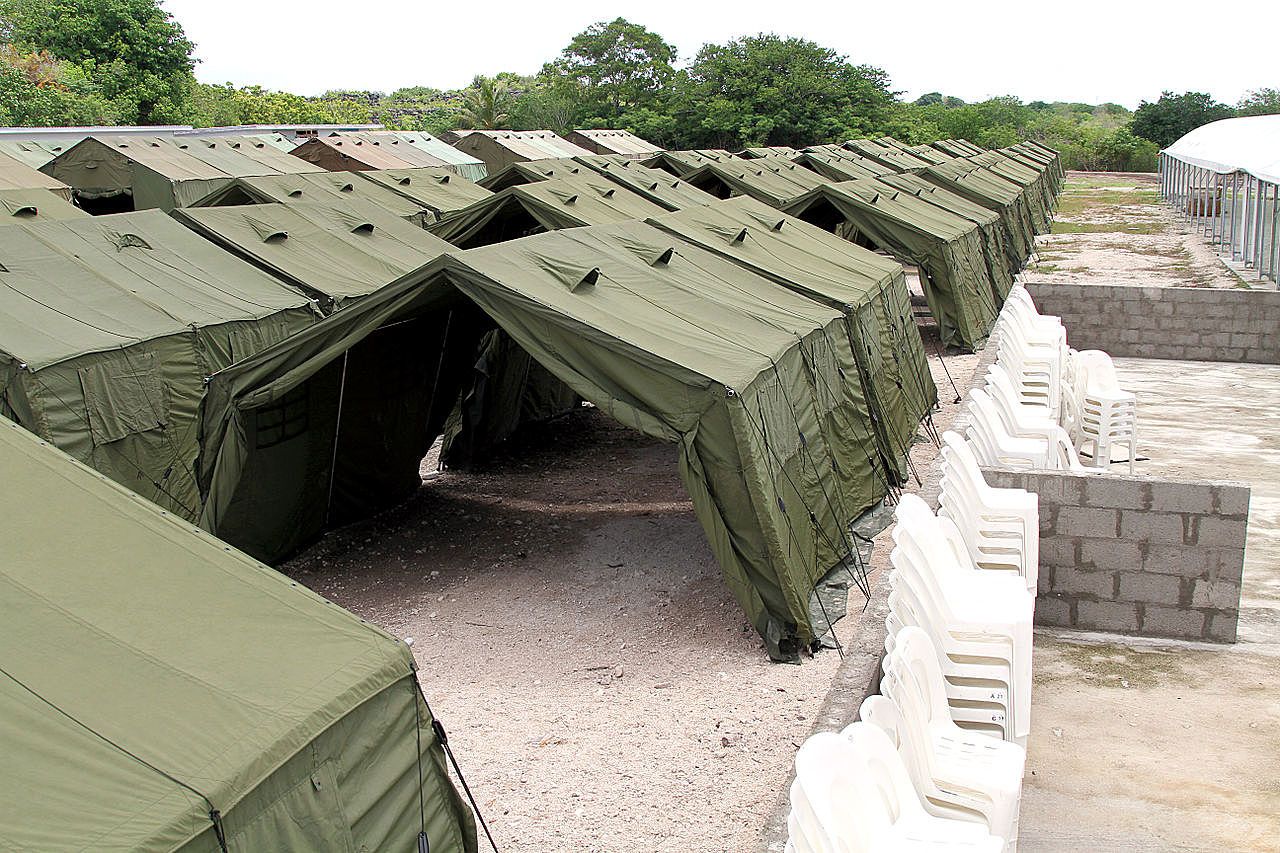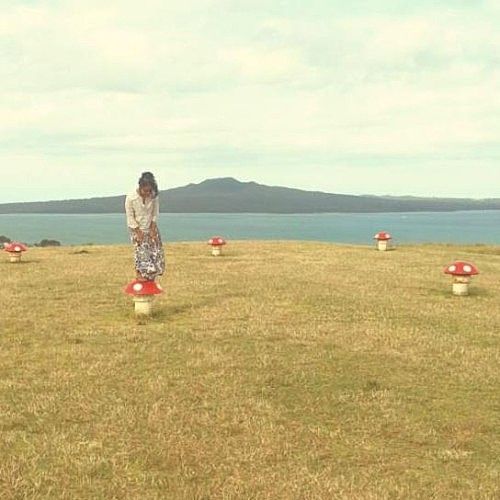A Warning and A Plea
Saziah Bashir on Trump's Muslim ban, and our disastrous response
The past year or so saw all my social media feeds, the news itself, and even lightweight morning radio shows taken over by interest in the American elections. Rightfully so - what they do over there should matter to everyone. The United States is the world’s largest consumer market, its second largest polluter, and has the largest military arsenal on the planet. Their decisions, their policies, their successes and their failures affect us all.
I watched as my admittedly leftist social bubble’s reactions shifted from excitement over Sanders and amusement over Trump towards something akin to a slow, creeping horror. That feeling you get when you walk into a dark alleyway and your skin starts to crawl and your senses feel heightened somehow. There’s a ringing in your ears and your body is telling you that you shouldn’t be here, you need to get out, you need to run.
I had a conversation with a friend of mine who is a policy advisor in Wellington at about 10.26pm on November 8th, 2016. Due to the time difference, it was barely morning in the US then. I asked her to call it, making light of the situation as if we were talking about a sporting event. She called for Trump. I told her I had a sinking feeling in my gut that told me the same. But like the law nerds we were, we consoled ourselves with thoughts of checks and balances, the Judiciary and Congress, that Constitution of theirs. Right? I signed off with the following text: “One last sleep before there’s a President-elect Trump and the world as we know it is officially beyond redemption. Gn!” To which she replied “Niters!”
Did we know we were kissing all semblance of normalcy goodbye with a few flippant words and emojis?
Just so you know, this is not an academic or insightful piece of calm, rational political commentary. You can find those anywhere right now in the usual papers and blogs, most written by my white male peers. This is an emotional, angst-ridden personal plea.
Indeed, this may feel melodramatic - an overreaction to something that admittedly does not, in practical terms, affect me much right now. I’m safely ensconced in my home in Auckland, a black passport with a Kiwi coat of arms in the drawer of my bedside table, pages upon pages stamped with visas from recent and comparatively stress-free travels. A relatively privileged, peaceful life. A brown, Muslim, immigrant woman, yes - but one who spent the weekend brunching and hiking with friends, watching cricket with Dad, and watchlisting cars on Trade Me because it’s time for an upgrade.
Even in light of Trump’s executive order a week ago - the “Muslim Ban” - why does this hurt me so much, apart from the obvious in that it should be hurting anyone with an iota of humanity and a social conscience? Yes, I have family in the US who are vulnerable to Islamophobic and xenophobic violence - but they’ve been fine so far. Why the particular strain of anxiety that has me up at night? Why the rage that has me practicing arguments in the shower with imaginary racist foes, as if I expect my barista apropos of nothing to suddenly urge me to condemn Isis, if I’m really not a radical, as they hand me my flat white? Why, at a loss for how else to express my concern outside of Twitter and Facebook, have I bothered writing long emails to my local MP, the PM, members of the opposition about making a statement, raising the refugee quota, doing something, anything, please? Why this heavy worry that feels like it has settled into my bones, never to leave again?
This is not practical. I’m making things personal. My approach to this is from the gut and from the heart. And even so, I doubt myself constantly, so undermined am I as a person, so uncertain about whether I’m coming over as cautious or just absurd. I feel as if the very state of the world is gaslighting me. Despite that, I speak, and I have nothing to offer but what I feel.
Because you don’t need me for the facts (that none of the terrorists who orchestrated 9/11 or any attacks on US soil since originated from any of the banned countries, and none were refugees; that the list of banned countries excludes the rich ones Chief Cheeto has business interests in (and for that matter, where known terrorists did in fact originate from); that refugees are already amongst the most heavily vetted migrants and pose little to no threat when seeking asylum outside of Europe. And you certainly don’t need me to rehash the old “all Muslims aren’t terrorists” because if you’re still having that conversation then we cannot be having this conversation. The facts are out there, but we live in a post-factual world.
I make this personal because what’s at stake is my humanity, as a woman, as a woman of colour and as a Muslim. When the humanity of any of us is called into question, is somehow up for grabs or contention, is denigrated and dismissed, all of our humanity is at stake. So I offer you what I feel, and what I feel is scared. I am terrified.
I’ve noticed a few more hostile glances thrown my hijabi mother’s way when we’re out shopping, a few more slurs yelled out of car windows as my bearded dad goes for his evening walk. I’ve seen the owners of my regular takeaways take down halal signage because they tell me it keeps away non-Muslim customers. I’ve seen the national, state-owned broadcaster tout its own poll on burqa bans. Where once I saw ignorance, now I sense malice.
There is a new bully in the playground, that much has been clear for months. What’s even worse (and what the past week has revealed) is that none of the other kids are willing to really stand up to him. And from one perspective, I understand my country’s staying silent in the interests of self-preservation – Trump is volatile and unpredictable, and we are beholden to our economic interests in a globalised world where a few very rich people’s whims could spur us into recession.
This transactional approach makes me even more scared. It says my humanity is up for grabs if the price is right, and in an election year, what is the price of my dignity, my safety, my personhood? It’s difficult to tell. Our Prime Minister stayed largely silent on the subject until heavy criticism for his lack of comment drew out a very nonchalant, flaccid response. “I don’t believe it is a racist policy, but I’m not here to defend it…(it wasn’t) rolled out in a way that suited anyone much”. As for the climate this sort of hedging bets creates, all I can do is make educated guesses based on experience.
Even in quiet, sheltered New Zealand, I’ve noticed an uptick in racist rhetoric. I’ve noticed a few more hostile glances thrown my hijabi mother’s way when we’re out shopping, a few more slurs yelled out of car windows as my bearded dad goes for his evening walk. I’ve seen the owners of my regular takeaways take down halal signage because they tell me it keeps away non-Muslim customers. I’ve seen the national, state-owned broadcaster tout its own poll on burqa bans. Where once I saw ignorance, now I sense malice.
There was a time when it would have seemed unlikely, ridiculous even, but now it feels like a small leap to go from blaming immigrants for the housing crisis (ignoring the role immigration plays in our economic growth, by the way) to blaming immigrants for all of our nation’s woes. And then you capitalise on the wave of hate politics masquerading as populism sweeping the world and hone in on a particular type, a genre of immigrant that fits your narrative best. And then you close borders, and then you create registries, and then you create camps.
If this seems hyperbolic, remember that these camps already exist across the ditch, have existed for years, and because the people on those boats who end up in those camps are predominantly Muslim and brown, we’ve allowed that to happen. As we’ve allowed boatloads of asylum seekers, many of them women and children, to drown in the Mediterranean. They’re drowning as I write this, they’re drowning as you read this. It’s not hyperbole if it’s already happening.
It may be tempting to argue that we may have allowed these things to happen elsewhere, places over which we have little control. But here, in New Zealand, we would never stoop to such cruelty, such inhumane, ungenerous behaviour. Except, perhaps, that we don’t actually know how we would behave because out of sheer geographical luck, we’ve never been tested. If, for some reason, the boats full of desperate asylum seekers should venture our way rather than Australia’s, towards our more distant shores and our smaller economy, would our perceived liberal benevolence remain intact, or buckle and shatter under sufficient fear-mongering, proving itself a fragile veneer after all?
As I wrote this, reports were coming in of a shooting at a mosque in Quebec, not 48 hours after a mosque in Texas was burned to the ground. How long before our local mosque in Ranui is torched, maybe with my father praying inside? How long before someone at Pak N’ Save yanks off my mum’s headscarf? If my brother goes to Coachella, as planned, in April this year, will he be detained and interrogated at LAX, or worse, because there’s a Muhammad in his name?
At 30, I often ponder about motherhood. It’s hard not to when so many of my friends are having children now. Increasingly I’ve been entertaining a sickening thought: am I right to remain childless in this climate? Should I wait for the storm to pass? Why have children if there is even the slightest possibility you might see them end up in concentration camps?
But, you might argue: we have human rights conventions now, we have laws, domestic and international. History shows that the rule of law bends, disappears momentarily, when those in power find its presence inconvenient, to reappear only when the dust has settled and someone needs to be declared the victor. This has happened before, and we know how it goes.
The urges being fed here won’t be satisfied with additional border vetting measures or an inquiry into halal food. If you play out extreme xenophobia and hate-mongering divisive propaganda to its natural end all you’re left with is devastation. This is not about what is legal because even the unthinkable can be made legal. This is about what lies in people’s hearts, what rises to their tongues, what stays their hands and what raises them in a fist. In this age we are virtual trolls or poets, or physical warriors on the streets, but nothing hesitant and abstract and in between because the time for the dinner table and the armchair activist is past.
analogies about fascism and racism filled our curriculum (and our leaders’ curricula) at high school, but we haven’t extrapolated them into our daily lives and acts. What good is reading The Diary of Anne Frank in school if we’ve allowed ourselves to shut our doors on another generation of Syrian and Iraqi and Palestinian Anne Franks fleeing wars we’ve fuelled by our complacency and silence?
I feel less secure today, even with my New Zealand citizenship, than I ever have before, because what the world is increasingly signalling to me is that as a migrant, as a Muslim migrant, I am suspect, and therefore fair game. My legal rights are conditional, and no legal fiction of citizenship can shield me if the rhetoric of fear and the wave of hate, gets strong enough.
I am not equating my situation with the plight of refugees. I have clearly not suffered as they have. I am simply demonstrating that in my mind, very little separates what happens to them from what could happen to me tomorrow, if we were to lose even a little more grip on our collective humanity. It’s a slippery slope, this mass dehumanisation, and we started down that path centuries ago if you take our colonial pasts into account (and you should).
Seeing through what’s happening shouldn’t be complicated. Analogies about fascism and racism filled our curriculum (and our leaders’ curricula) at high school, but we haven’t extrapolated them into our daily lives and acts. What good is reading The Diary of Anne Frank in school if we’ve allowed ourselves to shut our doors on another generation of Syrian and Iraqi and Palestinian Anne Franks fleeing wars we’ve fuelled by our complacency and silence? Sales of 1984 soar, we’re quick to draw endless Hunger Games parallels, and we’re even getting an adaptation of The Handmaid’s Tale this year, but what good is our interest in dystopian fiction if it only serves to distract from our increasingly dystopian realities?
In 2017, will New Zealand’s political parties take the high road and stand up for me, and for refugees from Muslim majority states and for the dignity of all immigrants, when September rolls around? Or will they give in to the temptation of dog whistle politicking? Will New Zealanders themselves come through? Will they insist this tiny nation stand as a stalwart of the values of equality and fairness, perhaps only a symbolic stance in the grand scheme of things, but meaningful nonetheless (definitely meaningful, if you speak to the refugees we have taken in and what a difference it has made to their lives)? It’s heartening to see the resistance, people marching, out on the streets in protest. This action needs to be sustained, translate in turnout at an election and votes for those with courage, in praxis when it matters most: your own backyard, your own people.
(Am I your own people?)
The time for laughing things off, of shrugging as if this is all very far away, and even of being incredulous and in disbelief is past. Please, be terrified with me. Feel the same worry, the same anxiety that I feel. Share my anger. Stay outraged. Do not succumb to resistance fatigue. Make my problem yours, acknowledge that my fate is in everyone else’s, meaning your, hands.
I can’t help but feel as if we are standing on the precipice of something in history. This is our Sliding Doors moment. It’s hard to identify these moments until they’re past, but hindsight is always brutally clear. So it would be prudent to err on the side of what is courageous, bold and ultimately, right. If not, remember this plea and others like it, remember that you were warned of what was at stake, and what we stood to lose.


